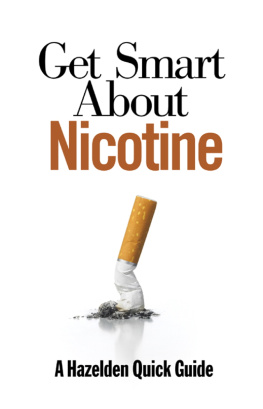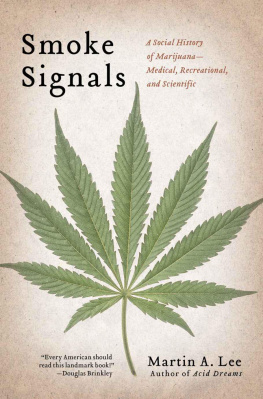Introduction
W ritings about tobacco cascade from cliffs of books, magazine articles, research papers, and government studies. Think of any place where words exist and tobacco is there; it is surely one of the worlds most thought about and written about topics. There have been billions of words, perhaps trillions, written about this one plant in the five hundred years since it was introduced to Europeans who at the time were ravenous for gold, not botanical curiosities.
Columbus mentioned it in his diary after landing in the West Indies while trying to find his way to the Orient. Jacques Cartier, who landed farther north than Columbus, in what is now Canada, also wrote about this odd weed, unknown in Europe but chewed, smoked, and used as medicine by the Indians. The first quill strokes that these explorers put to paper about the New World gave the plant scant attention, but the world soon became obsessed with it.
Today, do an Internet search for tobacco and you get 160 million hits in 0.12 seconds. Try smoking and you get five hundred million hits in 0.16 seconds. Tobacco control produces 24 million hits in 0.18 seconds.
Many world governments now are awash with policies, reports, conferences, and visioning sessions on tobacco and the problems tobacco has created for humankind, plus the economic benefits gained through tobacco taxation. Tobacco control has become an industry, growing ever larger as anti-smoking campaigns target developing countries.
If few subjects have been more written about in the history of the world, why then would anyone write yet another word about tobacco, let alone another book? Well, the reason is exactly because so much has been written already. Few people have the time, or the inclination, to read everything about tobacco, so it seemed like a good idea to gather the most interesting and pertinent pieces of tobacco history and combine them with information about the developments and issues of today, including contraband and smuggling.
Smoke Signals is not in any way an academic study. It is an attempt to help readers become more informed about an issue that has much impact, direct and indirect, on their lives. We live in a society in which information is spilling over the gunwales of our daily lives, swamping us before we can become properly informed. An informed public is critical, however, in helping governments make the best decisions for solving the social and economic problems arising from tobacco and its related issues.
Tobacco is an especially difficult and complex subject, especially in North America, because Natives are inexorably connected to it. They introduced European settlers to tobacco, and now are taking back control of more and more of the aspects of the growth, processing, distribution, and selling of it. The issues of tobacco use and the unresolved grievances of Native people need to be discussed and resolved together.
A note on terminology: It is difficult to know what to call the original inhabitants of the Americas without offending someone. The term Indian is a misnomer created by Europeans who thought they had found the Far East when they landed in North America. It is a term not liked by some people, some Natives included.
In the 1970s the politically correct name for Canadas Native citizens living on reserves became First Nations people. The name does not cover all original peoples, however. There are Mtis and Inuit, neither of whom live on reserves, and many Natives do not live on reserves and are not covered by the First Nations terminology.
The Canadian federal government now uses the term Aboriginal to cover all varieties of Natives that it used to refer to as Indians. In North America, however, the word Aboriginal always had been thought of in relation to Australia and its aborigines. Aboriginal is a term abhorred by some people because it never applied to North America in the first place. Also, it is seen as a way in which governments can lump all Natives together, without distinguishing them as separate peoples who form different Native nations.
In the United States, Indian is still the preferred word for Natives. Another distinction exists in the terminology used in the two nations: in the United States there are reservations, whereas in Canada there are reserves.
This book tries to call Native people what they call themselves: Anishnabek, Mohawk, Puyallup, Mikmaq, et cetera. When specific names cannot be used, I prefer Native rather than Aboriginal or Indian . However, for U.S. references, the term Indian is used when a specific name cannot be used, since that is the term in use in that country; Indian is also used for all Canadian historical references when more than one tribe or nation is addressed because thats how they were known until relatively recent times.
A note on the use of statistics. There are three kinds of lies: lies, damned lies, and statistics. This witty truth was popularized by Mark Twain (although it was not created by the great American writer). Whoever created it was trying to show the persuasive power of numbers, particularly the use of statistics to embroider and exaggerate an argument. In the tobacco control industry, statistics are sprinkled generously to flavour anti-smoking messages. They vary from organization to organization and they are often reasonably accurate, but no one should accept them without further investigation. The same applies to government statistics, and spending and revenue numbers.
Numbers are like fresh pretzel dough; they can be twisted into any form that suits the imagination, and should not be accepted at first glance.
1
Gift of the Manitou
N o one knows exactly when it all began, but it was sometime after the last ice age, perhaps eight thousand years ago, give or take a few millennia. Melting and withdrawing ice released frozen soils, exposing them to the warming sun, and encouraging plant life to awaken and flourish. More warmth brought more plant life as the great glaciers diminished.
After the ice withdrew, the mammoths, mastodons, and other huge beasts that had fed early humans disappeared rapidly, and inexplicably. It is believed that 85 percent of the earths large mammals became extinct at this time. No one knows exactly why, but the substantial climate change had to have been a factor.
The dramatic loss of the megafauna changed human life. Man, the hunter, was confronted with a dwindling source of once plentiful meat, and had to seek other sources of food. Legumes, more plentiful in the newly freed soils, were found to fill bellies and offer variety. People gathered more legumes as more big animals disappeared, and a natural progression saw them experimenting with the cultivation of plants for consumption. They learned methods of collecting seeds, planting them, and tricks for nurturing them into crops that produced valuable foods.













